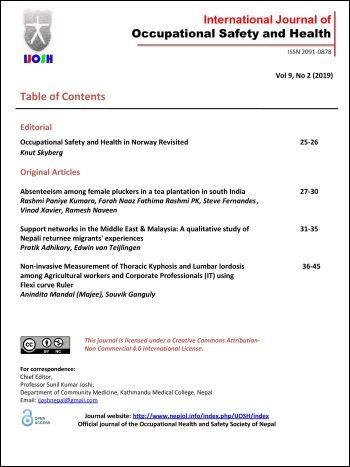Absenteeism among female pluckers in a tea plantation in south India
DOI:
https://doi.org/10.3126/ijosh.v9i2.25381Keywords:
Absenteeism, pluckers, tea plantations, causes, south IndiaAbstract
Background: The tea industry which is one of the world’s oldest agro-based industry provides direct employment to more than a million workers, of which most are women. Two of the main causes for decreased tea production in India is due to shortage of pluckers and their absenteeism which impacts tea productivity. So, this study was undertaken to study absenteeism rates and the causes of absenteeism among female pluckers in a tea plantation in South India.
Methodology: This was a cross section study undertaken in tea estates located in Anamalais, Tamilnadu. All female pluckers working in the estates were eligible to part of the study. The study population consisted of 256 female tea pluckers who were selected at random and an interview schedule was used to collect the following information – socio-demographic status, nature of the job, job satisfaction and reasons for absenteeism.
Results: The study population consisted of 80.9% permanent workers and 19.1% temporary workers, with an average work experience of 21.6years.The main cause of absenteeism was health related (47.8%), followed by visit to native place (29.3%), then illness among family members (15.7%) and either lazy of bored to report to work (7.2%).There was an association between absenteeism and hospitalization in the past one year, increasing number of children in the family and the number of years of work experience.
Conclusion: Majority of the pluckers were in the age group of 40-45 years. Women in this age group are more vulnerable to health issues such as osteoporosis, osteoarthritis, work related musculoskeletal disorders and also probably time taken off to take care of dependents apart from house old chores. Increasing age, illness of self or family member were the most important factors which contributed to increase absenteeism.
Downloads
Downloads
Published
How to Cite
Issue
Section
License
This license enables reusers to distribute, remix, adapt, and build upon the material in any medium or format for noncommercial purposes only, and only so long as attribution is given to the creator.





